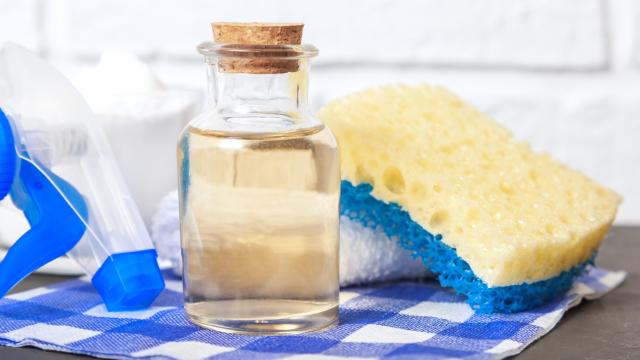If you spend any time looking for cleaning tips and hacks on social media, you’re well-acquainted with vinegar. On TikTok, it can do no wrong; in real life, however, it very much can. While touted as an economical, eco-friendly alternative to other cleaners, vinegar is also acidic and shouldn’t be used on certain surfaces and materials. Here’s when not to use vinegar.
Don’t clean these things with vinegar
You want to clean, not to corrode, so keep vinegar off of the following surfaces:
- Anything made of wood, especially hardwood. The finishes on hardwood flooring can be worn away by acidic vinegar, while unsealed wood can absorb it, causing swelling and possibly even cracking. Soap and water are best for all your wood.
- Anything with a wax surface, for the same reason: Vinegar can dissolve the coating. However, if you want to dissolve an old coat of wax to put a new one on, vinegar can help.
- Granite or marble countertops are also on vinegar’s no-go list. I’ve said this before and I’ll say it again: Granite is porous, so it’ll absorb what you clean it with—and you don’t want anything acidic in there.
According to PuroClean, you shouldn’t bother using vinegar to clean up greasy or protein-based stains either. Vinegar won’t cut grease, and with protein-based stains, vinegar can cause coagulation, turning the mess in question into a sticky, gluey substance that’s even harder to get off.
In general, a lot of the stuff you use every day has a protective coating of some kind, from your stainless steel appliances to your electronics—and vinegar wears down coatings. You can use diluted vinegar for glassware—and probably a handful of other things you’d never thought of before—but be mindful of most everything else.
Be careful mixing vinegar with other cleaners, too
Diluting vinegar makes it usable for some household tasks, yes, but you can’t just mix it with anything. Per Merry Maids, you should never mix it with bleach (or any product that contains bleach) because it can create a deadly, toxic gas. Sunrise Industrial Cleaners takes it a step further, cautioning against mixing it with hydrogen peroxide and even with baking soda.
Overall, you’re better off with a gentle, natural, store-bought cleaner or specific DIY recipes for anything that might have a coating or be porous.

Leave a Reply
You must be logged in to post a comment.